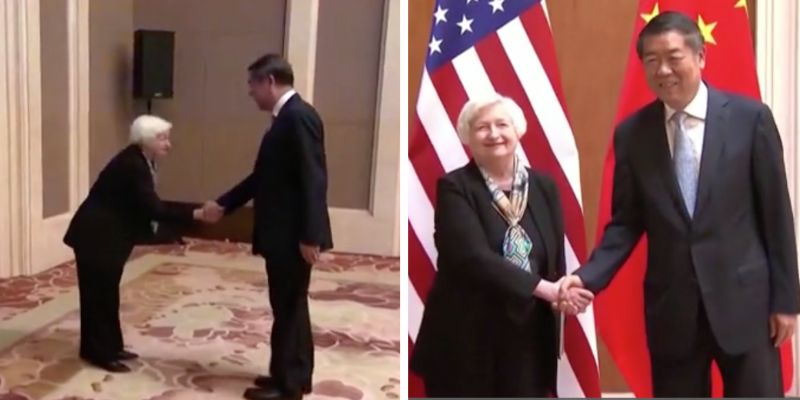In a blistering display that critics argue typifies the egregious miscalculations of the Biden administration, U.S Treasury Secretary Janet Yellen found herself in the throes of controversy during her inaugural visit to China. At the heart of the outcry is a video clip of Yellen bowing repeatedly to Chinese Vice Premier He Lifeng, with naysayers citing this as a salient symbol of America’s wavering international stature. Speaking to the New York Post, Bradley Blakeman, a senior White House staff member in the era of George W. Bush, lamented the perceived affront to American pride, stating starkly, “An American official does not bow.”
Janet Yellen bows to China. Literally. pic.twitter.com/JnEsfsExJF
— Citizen Free Press (@CitizenFreePres) July 8, 2023
Yellen, appointed Treasury Secretary under Biden’s administration and the pivotal second U.S. diplomat to travel to China in over five years, arrived with aspirations of enhancing communication and mollifying the simmering tensions between the two feuding powerhouses. Time and time again, as Blakeman puts it, the current administration “embarrasses ourselves and shows weakness.” This is not the negotiation strategy one should adopt with an adversary country, according to him. Dismayed by the breach of protocol, author Max Murray claimed that Yellen was seemingly unaware that, as an American official, her act of bowing was inappropriate. The reciprocal lack of supplication from the Chinese Vice Premier, who “backs away to give her more space to kowtow,” further exacerbates this incident.
NYU professor and expert in Chinese law and government, Jerome A. Cohen, concurred, reiterating that the, “bowing is not part of the accepted protocol.” The Daily Mail alleges that this protocol lapse was not Yellen’s only miscalculation. Addressing the media at the U.S embassy on Sunday, she proffered a sanguine outlook, proclaiming that both nations could “responsibly manage this relationship” and “thrive,” even amidst “significant disagreements.” Is this truly feasible when America’s customary protocol and pride are disregarded?
On opening her discourse with Vice Premier He Lifeng, Secretary Yellen lauded the “solid ties” between Chinese and American people, suggesting that continued investment in these connections is crucial. Advocating for what she termed ‘healthy economic competition,’ Yellen emphasized confronting and articulating concerns about specific economic practices. As a precursor to Yellen’s visit, Secretary of State Antony Blinken also visited China as part of a renewed impetus on bilateral communication; however, this was clouded by President Biden’s gaffe in calling Chinese President Xi Jinping a “dictator.”
In a keenly watched series of bilateral events, John Kerry, former Secretary of State and currently part of President Biden’s special envoy for climate change, is rostered for a visit to China later this year. With Yellen’s diplomatic blunder as backdrop, apprehension brews about how America’s standing will emerge post this visit.
In conclusion, Yellen’s bowing incident appears more than a mere faux pas and raises crucial questions regarding American resilience and global acclaim. Critics argue that the recent diplomatic foray furnished an unfortunate spectacle, a disconcerting demonstration of American vulnerability as opposed to influential poise. As the world watches, the Biden Administration must critically re-evaluate its stance vis-à-vis China. The state of affairs begs the question: What hope is there for American diplomatic authority in the face of demonstrative images of our leaders bowing in acquiescence?



